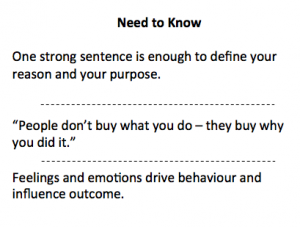Storytelling: It’s Not Just for Bedtime Anymore. Rapport: Part Four
October 29, 2015 ~ Written by: W.B. “Bud” Kirchner
 “After nourishment, shelter and companionship, stories are the thing we need most in the world.” ~ Philip Pullman
“After nourishment, shelter and companionship, stories are the thing we need most in the world.” ~ Philip Pullman
Just to repeat a couple points I’ve made along the way:
(1) This is not a “by the manual” Dale Carnegie course. Business (in my opinion) becomes such a personal event it is not like selling anything else.
(2) This is all about passion. If this doesn’t light your world up it certainly isn’t going to brighten anybody else’s.
(3) Communication is primarily nonverbal. (This might be a good time to review our series on nonverbal communication.)
Storytelling Is….
 I love it when a “sophisticated” (at least important) concept can be described with a simple word – in this case “storytelling.” Given the volumes that marketers (presuming utilizing neuromarketing tricks of the trade) persuade their consumers (whether other businesses or public customers) to buy, surely there are ideas on how to sell goods and services in a B2B context as well as B2C.
I love it when a “sophisticated” (at least important) concept can be described with a simple word – in this case “storytelling.” Given the volumes that marketers (presuming utilizing neuromarketing tricks of the trade) persuade their consumers (whether other businesses or public customers) to buy, surely there are ideas on how to sell goods and services in a B2B context as well as B2C.
Take it as gospel – facts are not as convincing as stories! Having said this imagine the power of strong facts woven into a story!! Now that is a business story!!
Stories create a place where we look at facts, figures and decisions in a different light. Plus, we store and recall memories differently – especially what are called episodic (autobiographical) memories. Civilizations have communicated via stories since forever so our brains are hardwired to process information in this form. Our reality is based on from the stories we tell ourselves which give our life meaning.
A Good Story is Like a Stew
“Storytelling is about two things; it’s about character and plot.” ~ George Lucas
It really is that simple. Look at Mr. Lucas’ Star Wars, arguably the most famous franchise in Hollywood history – at its core it is simply a story of good vs. evil. But look closely and you will find many sub-characters and subplots (ingredients) that make the story fuller and richer.
A few basic storytelling ingredients:
- Honesty
- The essential ingredient
- Examples
- Must be relatable
- Tangible
- “Make money”
- “Create value”
- Storyline
- Beginning – middle – end
- Imagery
- When we ‘see’ in the brain’s eye we process information differently
- Characters
- Make it human
Add a little spice:
- Humor
- Creates adrenaline release in storyteller and emotional tie with audience
- Irony and self-deprecation
- Emotions
- Weave into story to create empathy
- Metaphor
- Encourages pattern recognition
- Suspense
- Keeps the brain fully engaged
- Plausibility
- Must create believers
Delivery
- Non-verbal (body language, etc.) is just as important
Mystery Ingredient
- Unexpected value always works well!
- Punchline
The Goldilocks Principle
Your story can’t be undercooked or overcooked. It can’t be too thick or too thin. It can’t be too hot or too cold. It has to be just right.
How will you know if you got the stew right? You should enjoy outcomes such as these described by Joel McCabe in “Why Good Storytelling Beats Good Selling.”
- Capture the attention of the audience (or customer)
- Motivate individuals and groups to take action
- Build trust and rapport
- Make data and facts sing by becoming applicable, interesting, and relevant
- Infuse information with “stickiness” to improve retention. For example, everyone knows that “slow and steady wins the race.”
- Transform beliefs and change minds
As I often do – I would like to end by directing you to a good example of the points I have been trying to make. In this case it is easy – watch any Steve Jobs performance (like “How to live before you die.”) or any of Malcolm Gladwell’s TEDTalks.
And finally, as the US election heats up you can see storytelling at its best – and worst.
“Political language is designed to make lies sound truthful and murder respectable, and to give an appearance of solidity to pure wind.” ~ George Orwell
About the Author: W.B. “Bud” Kirchner is a serial entrepreneur and philanthropist with more than 50 years of business success. He is not a scientist or an academic but he does have a diversified exposure to neuroscience, psychology and related cognitive sciences. Generally speaking, the ideas he expresses here are business-angled expansions of other people’s ideas, so when possible, he will link to the original reference.
